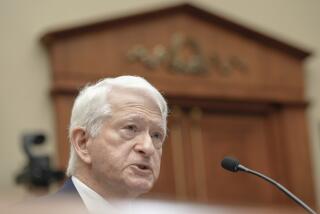Arab American Named to U.S. Terrorism Panel
- Share via
An Arab American civil rights attorney was named Friday to a national counter-terrorism commission, but Muslim organizations said the appointment would not end their concerns over the scuttling of their original choice for that post--a prominent Los Angeles Muslim leader.
Juliette N. Kayyem, 29, a Los Angeles native and Lebanese American Christian, has worked for two years on civil rights complaints stemming from counter-terrorism efforts, including the detention of Arab Americans and Muslims based on secret evidence and their alleged targeting at airports for questioning.
Kayyem, who lives in Boston, had worked on education, civil rights and national security issues for the Justice Department since graduating from Harvard Law School in 1995, but resigned on accepting the appointment. Atty. Gen. Janet Reno, who recommended her for the post, lauded her “integrity, intelligence and commitment to principle” in a statement released Friday.
“What I know I bring to the table is a very strong concern about the need for balance between effective counter-terrorism measures and concern for the civil rights and civil liberties of all Americans,” Kayyem said in an interview hours after being appointed by House Minority Leader Richard Gephardt (D-Mo).
Salam Al-Marayati of the Muslim Public Affairs Council--whose original appointment to the post was scuttled after attacks by some Jewish organizations that asserted he had condoned terrorism--said he welcomed the chance to work with Kayyem and other commission members. But he and others called on Gephardt to quickly meet with Muslims to address “unsettled grievances” that the appointment controversy produced.
“This is not a resolution of the initial issue, which is to deny a person the right to serve on an important commission because of political views that conflict with the pro-Israel lobby,” said Agha Saeed, chairman of the Muslim American Political Coordination Committee.
Other Islamic organizations said they were disappointed that no Muslim had been appointed to the commission--although most had declined to offer alternative names, instead urging Al-Marayati’s reinstatement.
“The issue of Muslim exclusion from the political process will not be resolved by this appointment, and this exclusion will cast doubt on the credibility of the commission,” said Ibrahim Hooper, spokesman for the Council on American-Islamic Relations in Washington.
Gephardt’s initial appointment of Al-Marayati had been hailed by American Muslims and Arabs as a sign that Washington was finally giving them a voice in the U.S. policymaking process, which they argue is dominated by pro-Israel groups. But the Democratic leader abruptly withdrew the appointment this month, citing difficulties in obtaining a timely security clearance. Kayyem already has a top-secret clearance because some of her work involved reviewing national security cases.
The decision to withdraw Al-Marayati’s nomination followed protests by several national Jewish organizations. They included the Zionist Organization of America, Anti-Defamation League, American Jewish Congress, American Jewish Committee and others that said Al-Marayati had likened supporters of Israel to Nazis and blamed the Jewish state for acts of terrorism by Muslims.
The turnabout infuriated Arab Americans and Muslims and heightened their concerns about being targeted for attacks aimed at excluding them from policymaking. Earlier this year, the Zionist group and other Jewish organizations had protested the appointments of Al-Marayati’s wife, Laila, to an international religious freedom commission and Joseph Zogby to the staff of Assistant Secretary of State Martin Indyck. Zogby is an attorney; his father, James, is a prominent Arab American leader. Joseph Zogby resigned, but Laila Al-Marayati continues to serve.
Kayyem’s appointment is not likely to draw fire from Jewish organizations; among other things, she does not have the paper trail of writings on the Mideast that was seized on in the attack on Al-Marayati. “The ZOA welcomes anyone of any ethnic background . . . to be a member of this commission, as long as they don’t have an extremist ideology or make extremist statements,” said Morton Klein, president of the Zionist group.
Kayyem said she had an interest in the Mideast but felt “kind of uncomfortable” talking about it. Asked whether she believed the commission should explore the root causes of terrorism--a position Al-Marayati took that drew fire from Jewish groups as a sign of condoning violence--Kayyem said:
“I think you cannot address these issues unless you have an understanding of the underlying issues of all players. But that doesn’t justify the use of violence in any instance.”
James Zogby, president of the Arab-American Institute in Washington, said Kayyem had been “open and responsive” in dealing with the community’s civil rights complaints. He credited her with helping reduce the number of Arabs and Muslims being unduly stopped at airports for searches and questioning.
“She understands the abuses that can arise when biases become policy,” Zogby said.
Meanwhile, a Southern California Jewish-Muslim group formed to overcome the acrimony produced by the Al-Marayati affair this week revived a code of ethics to govern debate between the two groups.
The code of ethics failed to move forward last year after the Zionist group and others criticized Jewish organizations for cooperating with Al-Marayati. Rabbi Neil Comess-Daniels of Beth Shir Shalom synagogue in Santa Monica said, however, that the group would first seek support for the code from the Southern California Board of Rabbis before taking it to the wider Jewish community.
More to Read
Sign up for Essential California
The most important California stories and recommendations in your inbox every morning.
You may occasionally receive promotional content from the Los Angeles Times.














